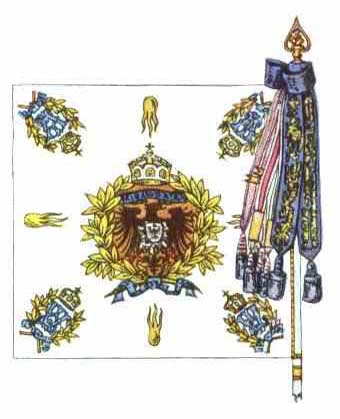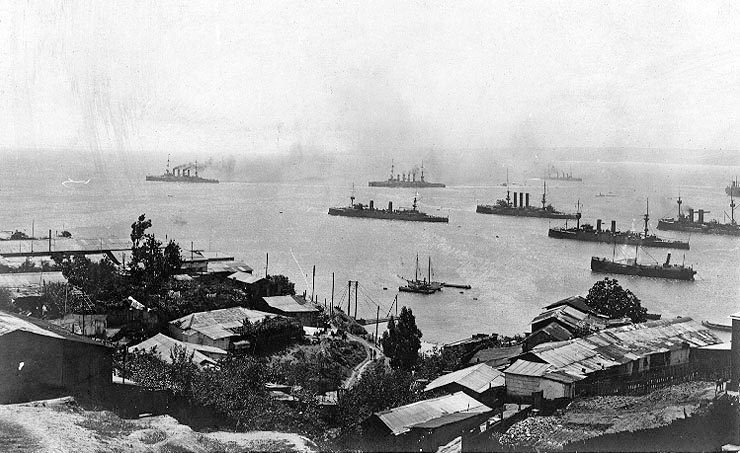|
Otto Von Diederichs
Ernst Otto von Diederichs (7 September 1843 – 8 March 1918) was an Admiral of the Imperial German Navy (''Kaiserliche Marine''), serving in the Prussian Navy and the North German Federal Navy. Early life Diederichs was born 7 September 1843 in Minden, Westphalia, Kingdom of Prussia (now in North Rhine-Westphalia, Germany). He entered the Prussian naval officer candidate program along a circuitous route, with an incomplete secondary education, a short stint as a Prussian army cadet and service in the merchant marine. After Naval School graduation at Kiel and Atlantic training voyages on the Prussian sail frigate SMS ''Niobe'', he was commissioned ''Unterleutnant zur See'' ieutenant JGin 1867. He served a brief tour aboard the royal yacht ''Grille''. During the Franco-Prussian War of 1870-1871 he commanded the coastal gunboat SMS ''Natter''. Although a French fleet maneuvered in the North Sea where ''Natter'' was deployed, "the French battle plan had little impact on Diederich ... [...More Info...] [...Related Items...] OR: [Wikipedia] [Google] [Baidu] |
Minden
Minden () is a middle-sized town in the very north-east of North Rhine-Westphalia, Germany, the greatest town between Bielefeld and Hanover. It is the capital of the district (''Kreis'') of Minden-Lübbecke, which is part of the region of Detmold. The town extends along both sides of the River Weser, and is crossed by the Mittelland Canal, which is passing the river on the Minden Aqueduct. In the 1,200 years longing time of written history, Minden had functions as diocesan town from 800 AD to the Peace of Westphalia in 1648, as capital of the Prince-Bishopric of Minden as imperial territory since the 12th century, afterwards as capital of the Prussian territory of Minden-Ravensberg until the end of the Holy Roman Empire in 1806, and as capital of the East-Westphalian region from the Congress of Vienna until 1947. Furthermore Minden has been of great military importance with fortifications from the 15th to the late 19th century, and is yet place of a garrison. Minden is ... [...More Info...] [...Related Items...] OR: [Wikipedia] [Google] [Baidu] |
Viktor Valois
Victor Valois (1841–1924), also called Anton Friedrich Victor Valois, was a vice-admiral (Vizeadmiral) in the German Imperial Navy. He graduated from the post-graduate Naval War College, the Imperial Naval Academy (Marineakademie) in 1874 in a class with three other future admirals: Otto von Diederichs, Felix von Bendemann, Gustav von Senden-Bibran. Commissioned into the Prussian navy in 1857, Valois fought at the Battle of Jasmund in 1864. Between 1865 and 1868 he circumnavigated the world and later served in the Franco-Prussian War as captain of . He sank or captured several French ships before being blockaded in Vigo until the end of the war. In 1890 he became commander of the German East Asia Squadron. Towards the end of his naval career and in retirement he was active in the debate regarding the role of the German navy. Valois supported creating a fleet of light commerce raiders, as opposed to the orthodoxy of building up a battleship force for a decisive fleet action. H ... [...More Info...] [...Related Items...] OR: [Wikipedia] [Google] [Baidu] |
Bundesarchiv Bild 134-B2414, Tsingtau, Blick Auf Den Diederichsweg
The German Federal Archives or Bundesarchiv (BArch) (german: Bundesarchiv) are the National Archives of Germany. They were established at the current location in Koblenz in 1952. They are subordinated to the Federal Commissioner for Culture and the Media ( Claudia Roth since 2021) under the German Chancellery, and before 1998, to the Federal Ministry of the Interior. On 6 December 2008, the Archives donated 100,000 photos to the public, by making them accessible via Wikimedia Commons. History The federal archive for institutions and authorities in Germany, the first precursor to the present-day Federal Archives, was established in Potsdam, Brandenburg in 1919, a later date than in other European countries. This national archive documented German government dating from the founding of the North German Confederation in 1867. It also included material from the older German Confederation and the Imperial Chamber Court. The oldest documents in this collection dated back to the year ... [...More Info...] [...Related Items...] OR: [Wikipedia] [Google] [Baidu] |
Prince Heinrich Of Prussia
A prince is a male ruler (ranked below a king, grand prince, and grand duke) or a male member of a monarch's or former monarch's family. ''Prince'' is also a title of nobility (often highest), often hereditary, in some European states. The female equivalent is a princess. The English word derives, via the French word ''prince'', from the Latin noun , from (first) and (head), meaning "the first, foremost, the chief, most distinguished, noble ruler, prince". Historical background The Latin word (older Latin *prīsmo-kaps, literally "the one who takes the first lace/position), became the usual title of the informal leader of the Roman senate some centuries before the transition to empire, the ''princeps senatus''. Emperor Augustus established the formal position of monarch on the basis of principate, not dominion. He also tasked his grandsons as summer rulers of the city when most of the government were on holiday in the country or attending religious rituals, and, fo ... [...More Info...] [...Related Items...] OR: [Wikipedia] [Google] [Baidu] |
Seebataillon
''Seebataillon'' (plural ''Seebataillone''), literally "sea battalion", is a German term for certain troops of naval infantry or marines. It was used by the Prussian Navy, the North German Federal Navy, the Imperial German Navy, the Austro-Hungarian Navy, the ''Kriegsmarine'', and briefly in the ''Bundesmarine''. In 2014, also the modern German Navy established a naval force protection unit called ''Seebataillon''. Establishment and history Kingdom of Prussia The first ''Seebataillon'' was organized on 13 May 1852 as the Royal Prussian ''Marinier-Korps'' at Stettin. This formation provided small contingents of marines to perform traditional functions such as protecting officers, general policing aboard warships and limited amphibious shore intrusions. The ''Seebataillon'' in 1870 had a strength of 22 officers and 680 non-commissioned officers and men. Battalion headquarters was then located at Kiel. German Empire After the establishment of the German Empire in 1871, Chancel ... [...More Info...] [...Related Items...] OR: [Wikipedia] [Google] [Baidu] |
Jiaozhou Bay Concession
The Kiautschou Bay Leased Territory was a German leased territory in Imperial and Early Republican China from 1898 to 1914. Covering an area of , it centered on Jiaozhou ("Kiautschou") Bay on the southern coast of the Shandong Peninsula (german: Schantung Halbinsel). ''Jiaozhou'' became romanized as Kiaochow, Kiauchau or Kiao-Chau in English and as Kiautschou or Kiaochau in German. The administrative center was at Tsingtau (Pinyin ''Qingdao''). It was operated by the East Asia Squadron of the Imperial German Navy. The Russian Empire resented the German move as an infringement on Russian ambitions in the region. Background of German expansion in China Germany was a relative latecomer to the imperialistic scramble for colonies across the globe. A German colony in China was envisioned as a two-fold enterprise: as a coaling station to support a global naval presence, and because it was felt that a German colonial empire would support the economy in the mother country. Densely ... [...More Info...] [...Related Items...] OR: [Wikipedia] [Google] [Baidu] |
Prince Chlodwig Zu Hohenlohe-Schillingsfürst
A prince is a male ruler (ranked below a king, grand prince, and grand duke) or a male member of a monarch's or former monarch's family. ''Prince'' is also a title of nobility (often highest), often hereditary, in some European states. The female equivalent is a princess. The English word derives, via the French word ''prince'', from the Latin noun , from (first) and (head), meaning "the first, foremost, the chief, most distinguished, noble ruler, prince". Historical background The Latin word (older Latin *prīsmo-kaps, literally "the one who takes the first lace/position), became the usual title of the informal leader of the Roman senate some centuries before the transition to empire, the '' princeps senatus''. Emperor Augustus established the formal position of monarch on the basis of principate, not dominion. He also tasked his grandsons as summer rulers of the city when most of the government were on holiday in the country or attending religious rituals, and, ... [...More Info...] [...Related Items...] OR: [Wikipedia] [Google] [Baidu] |
East Asia Squadron
The German East Asia Squadron (german: Kreuzergeschwader / Ostasiengeschwader) was an Imperial German Navy cruiser squadron which operated mainly in the Pacific Ocean between the mid-1890s until 1914, when it was destroyed at the Battle of the Falkland Islands. It was based at Germany's Kiautschou Bay concession in China. Background The Treaty of Peking of September 1861 between the Kingdom of Prussia and China allowed Prussian warships to operate in Chinese waters. As East Asia grew in economic and political importance to the recently united Germany, in 1881 a flying squadron was formed for the area under the command of a flag officer. Since African colonies were then seen as of greater value, an African Cruiser Squadron was established in 1885 with permanent status, and shortly thereafter the Imperial German Navy reduced the East Asia presence to two small gunboats. From 1888 to 1892, was flagship of the German East Asia Squadron, initially under vice-admiral Karl August De ... [...More Info...] [...Related Items...] OR: [Wikipedia] [Google] [Baidu] |
Alfred Von Tirpitz
Alfred Peter Friedrich von Tirpitz (19 March 1849 – 6 March 1930) was a German grand admiral, Secretary of State of the German Imperial Naval Office, the powerful administrative branch of the German Imperial Navy from 1897 until 1916. Prussia never had a major navy, nor did the other German states before the German Empire was formed in 1871. Tirpitz took the modest Imperial Navy and, starting in the 1890s, turned it into a world-class force that could threaten Britain's Royal Navy. However, during World War I, his High Seas Fleet proved unable to end Britain's command of the sea and its chokehold on Germany's economy. The one great engagement at sea, the Battle of Jutland, ended in a narrow German tactical victory but a strategic failure. As the High Seas Fleet's limitations became increasingly apparent during the war, Tirpitz became an outspoken advocate for unrestricted submarine warfare, a policy which would ultimately bring Germany into conflict with the United States. By ... [...More Info...] [...Related Items...] OR: [Wikipedia] [Google] [Baidu] |
Wilhelm II
, house = Hohenzollern , father = Frederick III, German Emperor , mother = Victoria, Princess Royal , religion = Lutheranism (Prussian United) , signature = Wilhelm II, German Emperor Signature-.svg Wilhelm II (Friedrich Wilhelm Viktor Albert; 27 January 18594 June 1941) was the last German Emperor (german: Kaiser) and King of Prussia, reigning from 15 June 1888 until his abdication on 9 November 1918. Despite strengthening the German Empire's position as a great power by building a powerful navy, his tactless public statements and erratic foreign policy greatly antagonized the international community and are considered by many to be one of the underlying causes of World War I. When the German war effort collapsed after a series of crushing defeats on the Western Front in 1918, he was forced to abdicate, thereby marking the end of the German Empire and the House of Hohenzollern's 300-year reign in Prussia and 500-year reign in Brandenburg. Wilhelm II was the son ... [...More Info...] [...Related Items...] OR: [Wikipedia] [Google] [Baidu] |
German Imperial Naval High Command
The German Imperial Naval High Command () was an office of the German Empire which existed from 1 April 1889 until 14 March 1899 to command the German Imperial Navy. A similarly named office existed in the Prussian Navy and the '' Kriegsmarine'' of Nazi Germany. After the dissolution of the German Imperial Admiralty (Kaiserliche Admiralität) on 1 April 1889, the Imperial Naval High Command, the Office of the Inspector-General of the Navy, and the Imperial Naval Office (Reichsmarineamt) were established as successor institutions. The Imperial Naval High Command was headed by a commanding admiral, directly subordinate to the emperor, Wilhelm II of Germany. With the same obligations and rights as a commanding general of the army, this admiral fulfilled the duties of a Chief of the Naval Staff. Under instructions from the emperor, he commanded all naval units at sea and ashore. When the German Emperor decided to take over the supreme command of the Navy himself on 14 March 1899, t ... [...More Info...] [...Related Items...] OR: [Wikipedia] [Google] [Baidu] |
Eduard Von Knorr
Ernst Wilhelm Eduard von Knorr (8 March 1840 – 17 February 1920) was a German admiral of the Kaiserliche Marine who helped establish the German colonial empire. Life Born in Saarlouis, Rhenish Prussia, Knorr entered the Prussian Navy in 1856. While serving on the corvette ''Danzig'', he fought against pirates off the coast of Morocco later that year. In 1859 he was promoted to Unterleutnant. From 1859–62 he sailed with the ''Elbe'' on an expedition to the Far East. Knorr was promoted to Leutnant in 1862 and Kapitänleutnant in 1865. On 12 November 1870, during the Franco-Prussian War, Knorr commanded the gunboat in a battle with the French aviso ''Bouvet'' near Havana, for which he was awarded the Iron Cross 2nd Class. In 1871 he was promoted to Korvettenkapitän. Beginning in 1874, Knorr took part in a voyage through the Pacific Ocean to discuss trade negotiations with Tonga on behalf of the German Empire. He was named Kapitän zur See in 1876, Chief of Staf ... [...More Info...] [...Related Items...] OR: [Wikipedia] [Google] [Baidu] |







